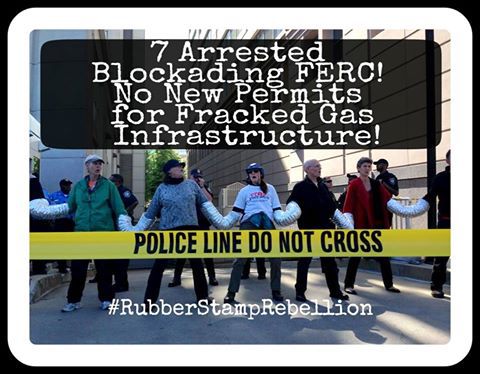But we’re not just in D.C. The Rebellion is happening with coordinated actions in 21 other communities. (See the list on our website.) This is the strength right now of our movement: coordinated efforts targeting both FERC and the corporations that take over families’ private property for their own private gain. And also emphasizing the need to immediately and drastically reduce the global warming impact of leaked methane (natural gas is methane), a fossil fuel that is starting, finally, to lose its cachet as “a bridge fuel to a clean energy economy.”
The commissioners have been unmoved by – and mostly have not even heard – the pleas of frontline communities to not pollute and destroy their homes and way of life, and the demands of climate activists to transition to a renewable energy future. They are insulated and isolated from the real world impacts their decisions create, so we’re holding them accountable.
In an escalation of our tactics, we visited the four FERC commissioners’ homes, which were a highlight of our week. The wonderful cooking collective Seeds of Peace served dinner on the sidewalk; we held banners, handed out our pamphlets, and talked to more people for more in-depth conversations than we’ve usually been able to have outside of FERC headquarters. We were gratified that almost nobody was hostile and many neighbors were very supportive of what we’re trying to do. We tacked to the commissioners’ front doors our own version of the eminent domain letter that companies – with FERC’s approval – send to homeowners declaring they’re taking their private property for the companies’ private profit to build a pipeline. (In one gated community we sent the letter in via a pizza delivery.) A FERC-approved project in western Massachusetts, for example, just got a judge’s approval to bulldoze the trees in a state forest protected as open space by the state’s constitution! The judge’s rationale was that if FERC gave its approval, then the project must be necessary.
Our visits created a (quiet) party atmosphere with no threat or intimation of a threat beyond the fact that we were in their private space -- with our voices, paper pamphlets and cloth banners -- not the bulldozers, chainsaws, armed guards and court injunctions the FERC-backed industry employs. This tactic was considered controversial and unacceptable even to some of our allies, but in the universe of possible non-violent direct actions, it was incredibly mild. As one of the #RubberStampRebellion participants from Massachusetts said, "It makes them a little uncomfortable, and they should be uncomfortable."
The visits might have spurred the commissioners to ban the public from their regularly scheduled meeting on May 19 due to “security concerns.” That only made more obvious the fact that the public has no role in their “public meetings” anyway, since we can’t speak without being hauled out and banned from returning.
Seven of us were arrested on Monday during afternoon rush hour, blocking the driveway leading to FERC’s underground garage. (That's me in the green jacket; two of the three men are not in the photo.) We were handled with kid gloves; the arresting officers kept asking us if our plastic cuffs were too tight or if we were okay in the back of the police car, and one lieutenant told us just before we were cuffed, “We’ll take care of you,” and he meant it in a good way. We were taken to the same facility as the last time I was held after a Keystone XL action in 2013 (see my July 31, 2013 post) and I was again in a holding cell with three other women. I had a great time – haven’t laughed so much in years – but we also discussed serious aspects of our personal lives, how to deal with sexism in the movement and our hopes for the future.
It always freaks me out a little to see how we – white middle class people – are treated in the criminal injustice system compared to how people of color are treated. It’s very schizoid. Risking arrest is a way for me to use my white privilege to try to advance justice.
I’m reading a fantastic book called This is an Uprising: How Non-Violent Revolt is Shaping the Twenty-First Century, by Mark and Paul Engler. (My daughter Becca is good friends with Mark and he wrote a nice dedication in her copy that she gave me to read, thanking her for her help with it, and then I had a moment of mamma pride to see that hers was the first name listed in the acknowledgements.) It’s making me think a lot about how to be effective; for example, wondering how long the similar kinds of actions we do in BXE (like being arrested outside of FERC) will be effective before we need to consider – still non-violent – alternatives, and how to combine different forms of organizing. I think BXE is very creative, supportive and fun-loving, but the crisis is still worsening day by day.
We’re planning a summer retreat to dig deeper into how we can most effectively ramp up the fight to save all life on earth. I’m hoping everyone can read This is an Uprising as a point of departure. More on that in future blogs.

 RSS Feed
RSS Feed
